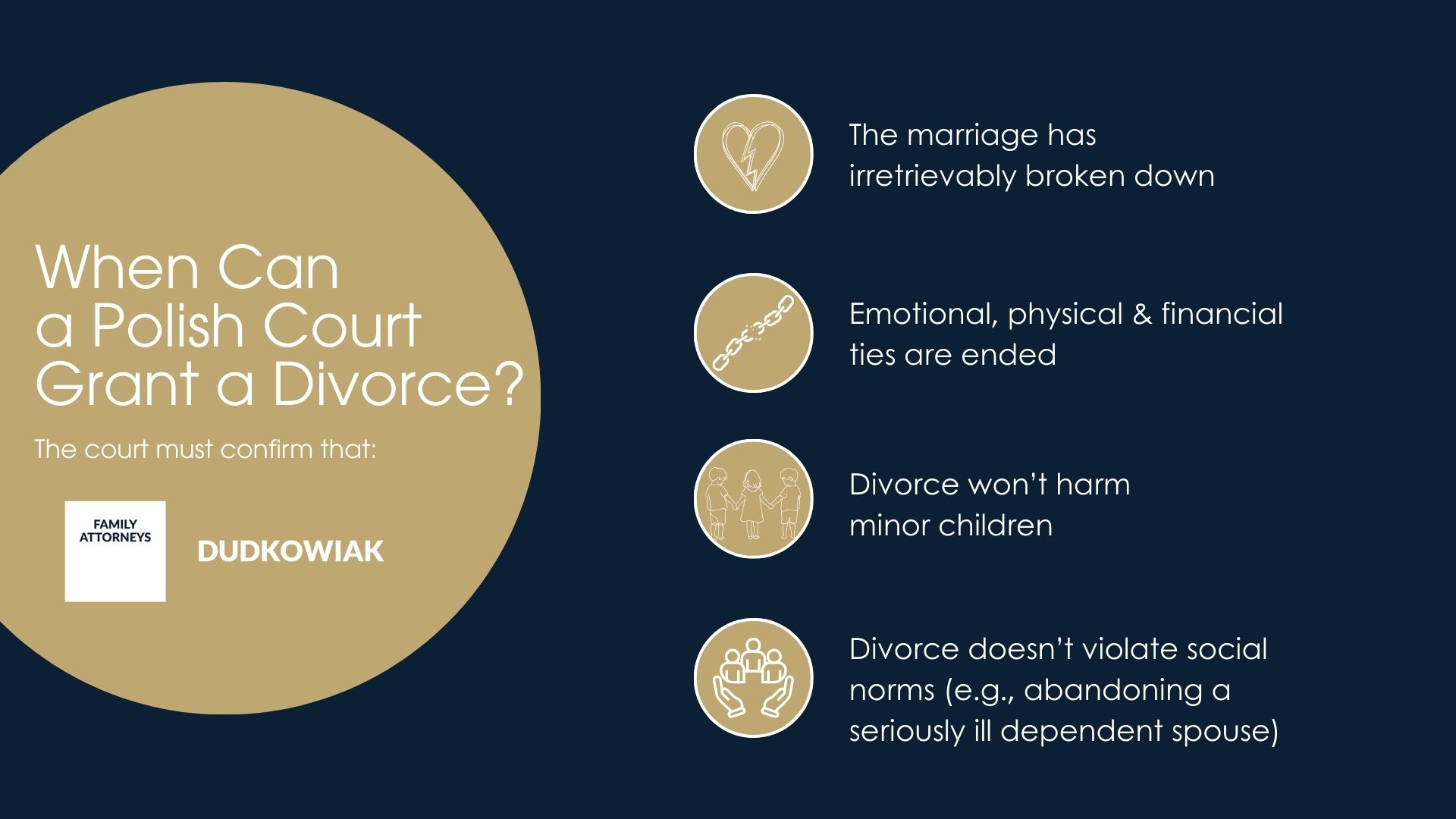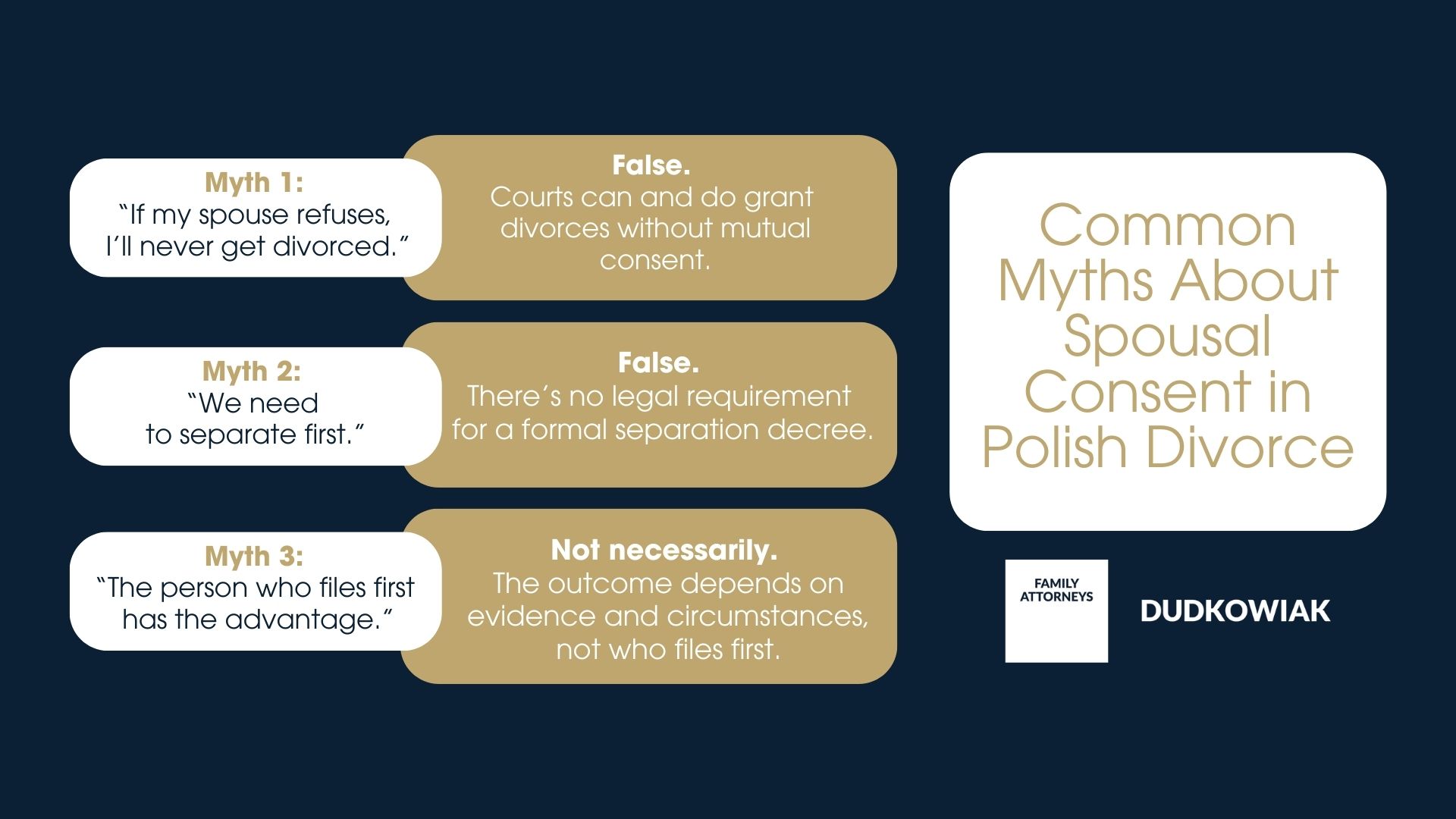Do I Need My Spouse’s Consent to Get a Divorce in Poland?
Divorce is rarely easy – emotionally or legally. One of the most common concerns among clients at Dudkowiak Family Lawyers is whether a divorce is even possible without the other spouse’s consent.
The short answer? Yes, you can get divorced in Poland without your spouse agreeing to it. But there are important legal conditions you must meet, and certain situations where consent – or lack thereof – can impact the outcome.
In this article, we explain:
- Whether consent is legally required.
- What happens if your spouse refuses.
- How Polish courts decide contested divorce cases.
- When fault or child welfare can block divorce.
Is Spousal Consent Required for a Divorce in Poland?
No. Under Polish civil and family law, the court – not your spouse – decides whether a divorce should be granted. Consent is not a legal requirement unless specific exceptions apply.
What the court needs to establish is this:
- The court must confirm that:
- That the emotional, physical, and economic ties between spouses have ended.
- That granting the divorce will not harm the best interests of any minor children.
- That the divorce does not contradict social norms (e.g., serious illness of a spouse who is solely dependent).
These rules are set out in Article 56 of the Polish Family and Guardianship Code.

What If My Spouse Refuses to Consent for Divorce in Poland?
You can still file for divorce even if your spouse opposes it.
The court will evaluate the facts of the marriage, not the opinion of the other spouse. A refusal to agree is not enough to block the divorce, unless one specific condition is met: if the court finds you are solely to blame for the breakdown, and your spouse does not consent, the divorce can be denied.
This is the most common scenario in which a lack of consent might matter – but even then, the court will assess whether withholding consent is reasonable or vindictive.
Example: If your spouse refuses to agree just to punish or control you, the court may override their refusal.
Can a Divorce Be Denied in Poland?
Yes, but only in limited cases. The most common reasons a court may deny a divorce include:
- The breakdown of marriage has not occurred: The court finds the relationship still functions on some level.
- One spouse is solely at fault, and the other refuses consent: The court upholds the objection if the refusal is not “socially unjustified.”
- The divorce would harm children: For example, a sudden change in parental access or living arrangements.
- The divorce contradicts public morality: For example, abandoning a severely ill spouse with no support.
These exceptions exist to prevent abuse of the divorce process – not to force spouses to remain married at all costs.
Can I File for Divorce in Poland Without Legal Separation?
Yes. Legal separation is not required before divorce in Poland. However, demonstrating that the marriage has functionally ended is essential. That may include showing:
- Lack of cohabitation
- No shared financial life
- No mutual emotional support
- Breakdown in communication
If you and your spouse are still living together, it may be harder – but not impossible – to prove the marriage has broken down.
What Happens During Divorce Proceedings in Poland?
If your spouse contests the divorce, the proceeding typically involves:
- Evidence gathering (emails, witness testimony, financial documents).
- Determining fault (if requested).
- Assessing child custody, contact, and alimony (spousal support) if relevant.
- A ruling from the family court granting or denying the divorce.
Common Myths About Spousal Consent in Polish Divorce
Myth 1: “If my spouse refuses, I’ll never get divorced.”
False. Courts can and do grant divorces without mutual consent.
Myth 2: “We need to separate first.”
False. There’s no legal requirement for a formal separation decree.
Myth 3: “The person who files first has the advantage.”
Not necessarily. The outcome depends on evidence and circumstances, not who files first.

Our Legal Opinion at Dudkowiak Family Lawyers
In our experience, attempts to weaponize “lack of consent” often backfire. The courts are guided by facts – not emotional tactics.
If you are facing a situation where your spouse refuses to agree to a divorce, don’t panic. Polish law protects your right to end a marriage that no longer functions. But a successful divorce – especially without mutual consent – requires preparation, documentation, and legal strategy.
Our firm offers support throughout every step of the process:
- Drafting the divorce petition.
- Representing you in court.
- Advising on child custody, alimony, and property division.
- Helping you respond to resistance or manipulation.
You can read more in our Divorce Guide.
You Don’t Need Permission to Leave a Marriage That’s Over
If your marriage has broken down, the court will listen – even if your spouse won’t. Whether you need guidance filing for divorce, preparing evidence, or facing resistance, our divorce and family law team is here to assist.
Explore your options with a qualified divorce attorney at Dudkowiak Family Lawyers. We protect your rights. We protect your future.


